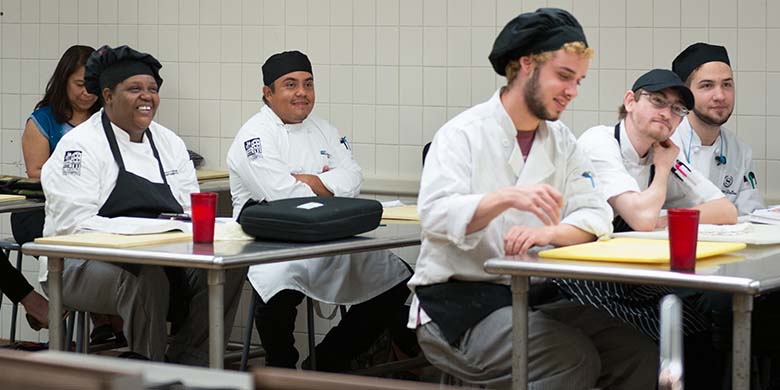Last updated on July 23, 2019
Do you enjoy cooking or have a creative flair in the kitchen? Are you interested in an exciting career in culinary arts? If so, head to culinary school at El Centro College in downtown Dallas. El Centro is the only college of DCCCD that offers the Food and Hospitality program. This program is designed to give students hands-on experience to prepare them for one of three exciting food service careers.
What Degrees and Certificates in Food and Hospitality Does El Centro Offer?
Students can choose from the Culinary Arts, Bakery/Pastry or Food and Hospitality Service specialties where they will receive training with experienced professionals. The Food and Hospitality Institute is an accredited program by the Accrediting Commission of the American Culinary Federation.
One way you can start a career in culinary arts is by learning about preparing, cooking and presenting food. People who work in this field typically work in restaurants.
Culinary Arts Associate Degree and Certificate Options
- Culinary Arts – Associate in Applied Sciences Degree, designed to provide students with basic and advanced skills needed to build a career in culinary arts and equip students for management positions.
- Culinary Arts Foundation Certificate, level one certificate, designed to provide the skills necessary to gain employment as a prep cook or cook.
- Culinary Arts Specialist Certificate, designed to provide advanced food service management and build on skills learned in the Culinary Arts Foundation Certificate.
Bakery and Pastry Degree and Certificate Options
A bakery/pastry chef is skilled in the making of pastries, desserts, breads and other baked goods. These degree plans will prepare students to work in bakeries, pastry shops, hotels and country clubs.
- Bakery/Pastry – Associate in Applied Sciences Degree, designed to provide students with basic and advanced skills to build a career as a baker/pastry chef.
- Bakery/Pastry Foundations Certificate, level one certificate, designed to develop skills to become a baker/pastry cook through basic and advanced baking techniques.
- Bakery/Pastry Specialist Certificate, designed to build on skills learned in the Bakery/Pastry Foundations certificate.
Food and Hospitality Degree Options
Food and Hospitality Service students will learn to work in a wide variety of food service positions.
- Food and Hospitality Management – Associate in Applied Sciences Degree, provides students with the skills needed to become a food service manager.
- Food and Hospitality Foundations Certificate, level one certificate, gives students the skills needed to gain employment as a food and hospitality worker in roles such as guest services, food preparation and bakery production.
- Food and Hospitality Specialist Certificate, builds on skills learned in the Food and Hospitality Foundations Certificate.
What Are the Different Job Roles in the Kitchen?
- Chef: a professional cook
- Chef de cuisine: executive chef’s right-hand person usually in a larger organization setting such as a hotel chain
- Chef de garde-manger (cold station): responsible for setting the dishes that do not require heat, such as salads and sometimes desserts
- Executive chef: oversees everything that goes on in the kitchen, from coordinating the kitchen staff to preparing meals
- Expediter: serves as the liaison between the customers and the line cooks
- Line cooks: in charge of cooking food
- Pastry chef: in charge of making breads, cakes, candies and desserts
- Sous-chef: in charge of the kitchen’s production such as taking inventory, supervising staff and coordinating daily specials
How Much Does It Cost to Go to Culinary School?
At just $59 per credit hour, Dallas Community Colleges have some of the most competitive tuition costs in the state! Head to our website to calculate your in-county tuition cost. (Not a Dallas County resident? No worries — we’ve got a calculator for that, too.)
Is There a Dress Code in the Kitchen?
El Centro students are required to wear a culinary school uniform in the kitchen. This uniform includes white chef jacket, black or houndstooth pants, chef hat, apron, kitchen shoes, socks and T-shirt. Ink pen, sharpie and instant read thermometer must be in your sleeve pocket.
Can I Take Culinary Classes Online?
Students can take the majority of their basic courses online such as English, science, mathematics, history, etc. However, the majority of culinary classes are not offered online. This is so that students can receive as much hands-on training as they can in the classroom learning various specialized skills and techniques.
Will My Culinary Degree Pay Off?
Everything is bigger in Texas, including job opportunities in the culinary field! Chefs and head cook jobs are expected to grow by ten percent through 2026 and have an average salary of about $46,730 in Texas. Food service manager positions are expected to grow by nine percent and have an average salary of $61,010 per year in Texas.
Where Can I Work With a Degree/Certificate in Food and Hospitality?
When it comes to jobs in the culinary field, the options are endless and include a wide range of industries.
- Hotels
- Restaurants
- Resorts
- Cruise ships
- Bistros
- Catering businesses
- Public and private schools
- Hospitals
- Grocery and specialty food stores
Ready to Start Your Culinary Career?
To get started, complete the DCCCD the admissions process and meet with an academic advisor at El Centro to discuss which classes you should take.
While you’re here, you should also consider checking out our previous programs of the month.
